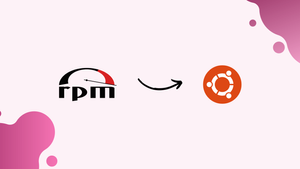Choose a different version or distribution
Introduction
Before we begin talking about how to install RPM packages on Ubuntu 20.04. Let’s briefly understand - What is an RPM package?
The RPM package is a popular software distribution format used in Linux systems. RPM stands for "Red Hat Package Manager". It is a file archive that contains software and additional information needed to install and manage programs. RPM packages make it easy to distribute software and ensure compatibility across different Linux distributions.
They simplify the installation process, making software management efficient and reliable. Whether you're a developer or a user, understanding RPM packages is crucial for seamless software installation.
In this tutorial, you will install RPM packages on Ubuntu 20.04. We will also address some of the FAQs related to the RPM installation.
Advantages of RPM packages
- Easy installation: RPM packages provide a straightforward installation process, saving time and effort.
- Dependency management: RPM packages analyze and resolve dependencies, ensuring software runs smoothly.
- Version control: RPM allows easy management of software versions, making upgrades and rollbacks hassle-free.
- Package integrity: RPM verifies the integrity of packages, ensuring secure and reliable software distribution.
- Wide compatibility: RPM packages are compatible with various Linux distributions, promoting ease of use and widespread usage.
Prerequisites
- A user account with sudo privileges
- Access to a terminal/command line
- apt package manager (included by default)
Step 1- Installing the Alien
1) Alien is a utility that can convert files between the Solaris pkg, Slackware tgz, Red Hat rpm, and Debian deb and Stampede slp formats. Remember to use the following command to enable the Universe repository on your system before installing the alien package:
sudo add-apt-repository universe
2) Once the repository is enabled, you must refresh the packages index before installing the alien package by using:
sudo apt update
sudo apt install alien
The above command will also install other necessary build tools.
Step 2 - Converting and Installing the RPM package
1) After that, to convert a package from RPM to the DEB format, you will use alien command with RPM package name:
sudo alien package_name.rpm
2) The conversion process often takes some time, depending on the size of the package. You will frequently encounter warning notifications. It will appear on your screen printed. In the event that the package conversion is successful, the following output will show that the DEB package was generated:
Output
package_name.deb generated
3) After that, you will have to install the deb package. Either use dpkg or the apt utility.
sudo dpkg -i package_name.deb
sudo apt install ./package_name.deb
This will finish the installation of the package. Then, all other requirements are satisfied, and it works with your system.
Step 3 - Install an RPM package
1) You will use the -i option instead of transcoding the packages and then installing them. The alien is instructed to install the RPM package directly.
sudo alien -i package_name.rpm
The package files will be automatically generated, installed, and removed by the aforementioned command once it has completed its installation.
FAQs to Install RPM packages on Ubuntu 20.04
Is it safe to install RPM packages on Ubuntu 20.04?
While it is generally safe, there might be compatibility issues or unresolved dependencies. Exercise caution and ensure compatibility before installing.
Can I use the Ubuntu Software Center to install RPM packages?
No, the Ubuntu Software Center does not directly support RPM packages. You would need to use the terminal or alternative package managers.
What are alternative methods to install RPM packages on Ubuntu 20.04?
You can use tools like "alien" or convert RPM packages to DEB packages using "alien -d package-name.rpm".
How can I uninstall an RPM package on Ubuntu 20.04?
You can uninstall an RPM package that has been converted to a DEB package using the command "sudo dpkg -r package-name".
Can I use RPM commands on Ubuntu 20.04?
Yes, you can use RPM commands with the "alien" utility installed. Just prefix your commands with "alien -r".
Are there any risks in converting RPM to DEB packages?
Converting packages between formats can have risks. It's important to back up your data and test the converted package before installation.
Where can I find RPM packages compatible with Ubuntu 20.04?
You can find RPM packages compatible with Ubuntu on various websites, repositories, or the official websites of the software you want to install.
Conclusion
We hope this detailed tutorial helped you understand how to install RPM package on Ubuntu. To learn more about RPM package installation, check out the official RPM documentation.
If you have any queries, please leave a comment below, and we’ll be happy to respond to them for sure.

